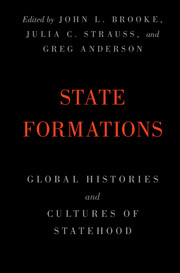Book contents
- State Formations
- State Formations
- Copyright page
- Dedication
- Contents
- Figures and Maps
- Tables
- Contributors
- Preface
- Acknowledgments
- Introduction
- Part I Definitions
- Part II Foundings
- 4 Comparative Perspectives and Early States Revisited
- 5 (Re)Introducing the State on the Medieval Swahili Coast
- 6 Renaissance States of Mind
- 7 Bringing the Sarkār Back In
- 8 Revolutionary State Formation
- 9 The Founding of Nondemocratic States
- Part III Agendas
- Part IV Memberships
- Conclusion
- Index
8 - Revolutionary State Formation
The Origins of the Strong American State
from Part II - Foundings
Published online by Cambridge University Press: 23 March 2018
- State Formations
- State Formations
- Copyright page
- Dedication
- Contents
- Figures and Maps
- Tables
- Contributors
- Preface
- Acknowledgments
- Introduction
- Part I Definitions
- Part II Foundings
- 4 Comparative Perspectives and Early States Revisited
- 5 (Re)Introducing the State on the Medieval Swahili Coast
- 6 Renaissance States of Mind
- 7 Bringing the Sarkār Back In
- 8 Revolutionary State Formation
- 9 The Founding of Nondemocratic States
- Part III Agendas
- Part IV Memberships
- Conclusion
- Index
Summary
- Type
- Chapter
- Information
- State FormationsGlobal Histories and Cultures of Statehood, pp. 138 - 155Publisher: Cambridge University PressPrint publication year: 2018



